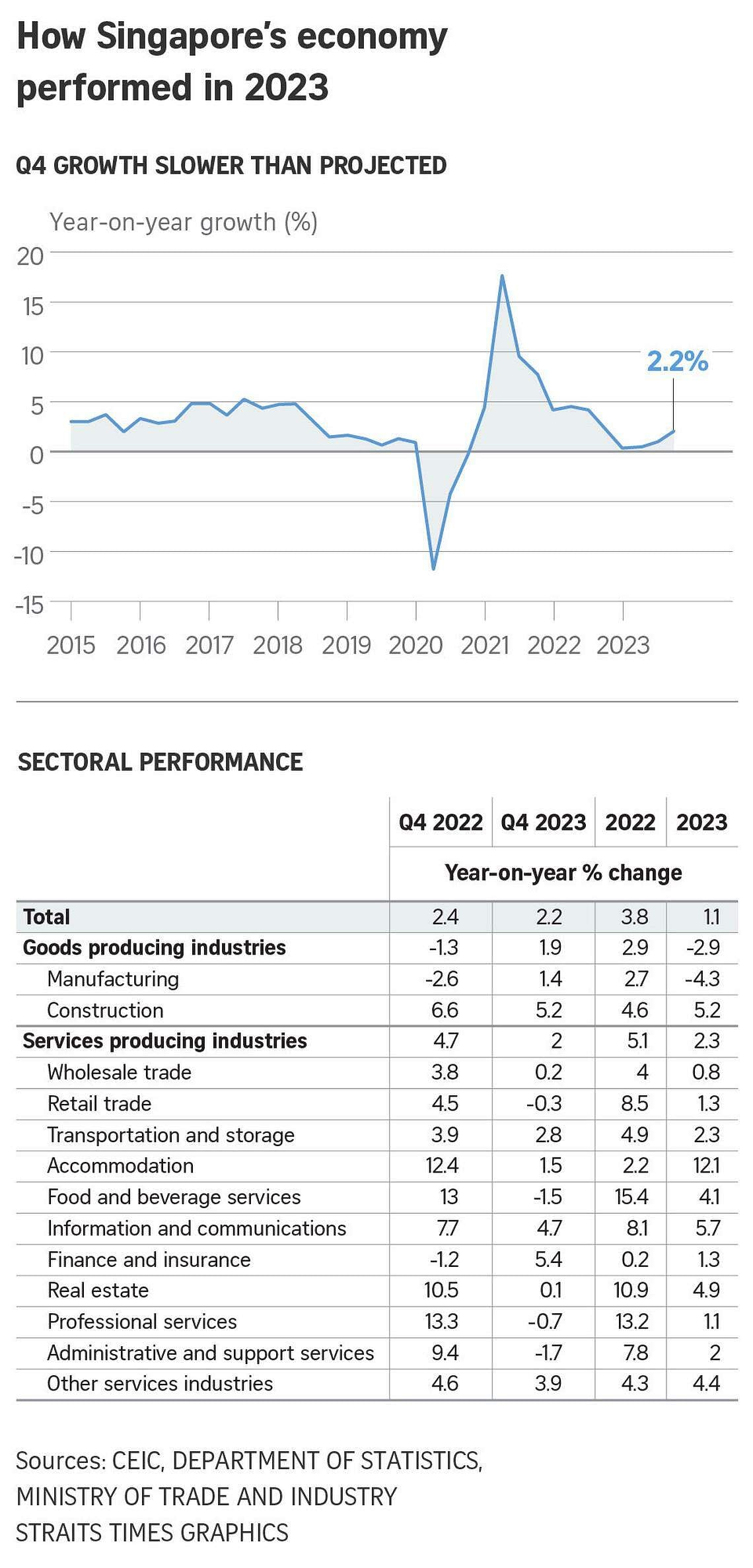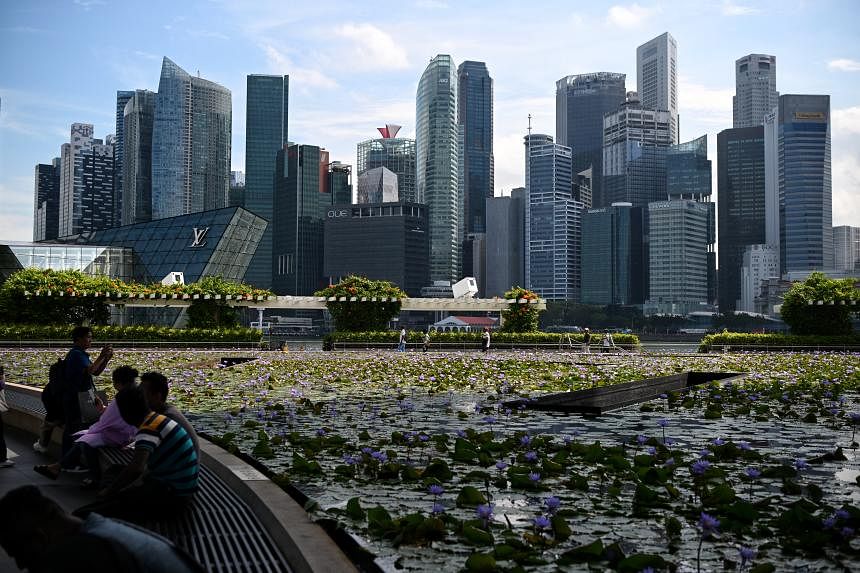SINGAPORE - Singapore maintained its forecast for the economy to grow 1 per cent to 3 per cent in 2024, as it warned that downside risks to the global economy remain significant.
For 2023, the economy grew 1.1 per cent, slowing from the 3.8 per cent expansion in 2022, the Ministry of Trade and Industry (MTI) said on Feb 15. The figure was below the 1.2 per cent official estimate made in January.
Growth in the final quarter of 2023 came in at 2.2 per cent year on year, down from the 2.8 per cent initially estimated.
It missed analysts’ average forecast of 2.5 per cent growth, as polled by Bloomberg.
MTI said Singapore’s external demand outlook for 2024 has remained largely unchanged since its last review in November.
“Growth in the advanced economies is expected to moderate in the first half of the year, mainly due to continued tight financial conditions, before recovering gradually in line with an expected easing of monetary policy as inflationary pressures recede,” said Dr Beh Swan Gin, MTI’s permanent secretary for development, at a media briefing following the release of the Economic Survey of Singapore 2023.
Regional economies are expected to see a pickup in growth in the year ahead, supported in part by the turnaround in global electronics demand, he added.
However, the global economy still faces serious downside risks. These include the Israel-Hamas conflict, the lagged effects of monetary tightening stressing regional economies with external funding needs, and idiosyncratic cost shocks that could weaken the economic recovery momentum.
MTI expects Singapore’s manufacturing and trade-related sectors to see a gradual pickup in growth in tandem with the turnaround in global electronics demand. The electronics and precision engineering industries in particular are projected to rebound, given the stronger-than-expected recovery in semiconductor sales.
Additionally, Enterprise Singapore on Feb 15 raised its 2024 forecast for growth in key exports to 4 per cent to 6 per cent, compared with its November projection of a 2 per cent to 4 per cent increase.
The continued recovery in air travel and tourism demand will support growth in Singapore’s tourism- and aviation-related sectors, including aerospace, air transport and accommodation, as well as consumer-facing sectors such as retail trade and food and beverage services, MTI said.
“Nonetheless, the pace of growth for most of these sectors is expected to moderate from that in 2023,” Dr Beh said.
OCBC Bank chief economist Selena Ling said 2023 marked the third straight year of growth since the 2020 pandemic-induced recession, when growth was a negative 3.9 per cent.
She noted that the manufacturing sector grew 1.4 per cent year on year in the fourth quarter after shrinking for four straight quarters.
The construction sector also gained further speed amid healthy public- and private-sector construction activities, she added.
For full-year 2023, manufacturing still shrank 4.3 per cent versus 2.7 per cent growth in 2022, while construction accelerated.

Within services, it was a bag of mixed fortunes – growth in the real estate industry more than halved, and growth in the food and beverage services industry moderated.
The retail sales index also braked from 7.2 per cent growth in 2022 to just 0.6 per cent in 2023, with fourth-quarter 2023 turning negative as more Singaporeans travelled overseas, which offset the return of international visitors, Ms Ling said.
Maybank economist Chua Hak Bin noted that revenge spending in services is fizzling out a lot more quickly than expected, as the strong Singapore dollar and high prices encourage locals to spend overseas.
He expects gross domestic product growth to pick up to 2.2 per cent in 2024, driven by manufacturing and trade-related services recovery.
DBS Bank economist Chua Han Teng is also expecting 2.2 per cent growth this year as manufacturing rebounds.
He expects Singapore’s Budget – to be announced on Feb 16 – to focus on helping businesses adapt to challenges and seize opportunities.
“More measures and allowances to tide through high costs, job disruption and retirement are likely. The priority will also be lifting capabilities by upskilling, riding emerging trends, and remaining attractive,” he said.
In 2023, manufacturing’s unit business cost grew 8.5 per cent, compared with 9.9 per cent in 2022.
MTI expects the overall unit labour cost for the economy to continue to rise in 2024, albeit at a more moderate pace compared with 2023.
This is because the growth in remuneration per worker is likely to soften amid easing labour market tightness. At the same time, the costs of utilities, fuel and transportation are expected to remain broadly stable, in line with the outlook for global oil prices in 2024.
Mr Edward Robinson, chief economist of the Monetary Authority of Singapore, said at the briefing that monetary policy remained appropriate despite “continuing uncertainties on the growth and inflation front”, which the central bank would monitor closely.
Core inflation has been easing from its peak of 5.5 per cent in January 2023, though it ticked up to 3.3 per cent in December.
Mr Robinson also said the property market is stabilising and expects the trend to continue.


